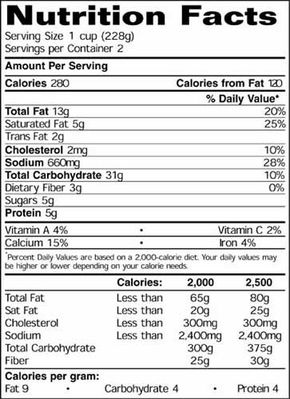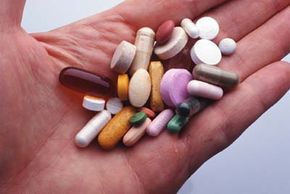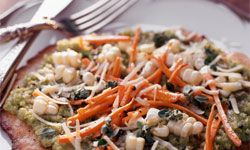While peanut butter does offer quite a lot nutritionally, eating only one thing is never really a good idea. Let's take a look at how food works, in general, to see why it is that man cannot survive by bread alone or in this case … peanut butter.
Your body uses food to stay alive. Consider what you might have eaten today: a bagel, milk, juice, ham, cheese, an apple, French fries, and so on. All of these foods contain seven basic components:
Advertisement
- Carbohydrates (both simple and complex) provide your body with its basic fuel. Your body uses carbohydrates like a car engine uses gasoline. Glucose, the simplest carbohydrate, flows in the bloodstream so that it is available to every cell in your body. Your cells absorb glucose and convert it into energy that drives the cells.
- Proteins are chains of amino acids. An amino acid is a small molecule that acts as the building block of any cell. Carbohydrates provide cells with energy, while amino acids provide cells with the building material they need to grow and maintain their structure.
- Vitamins are smallish molecules that your body needs to keep itself running properly. The body can produce its own vitamin D, but generally vitamins must be provided by food. The human body needs 13 different vitamins. A diet of fresh, natural food usually provides all of the vitamins that you need. Processing tends to destroy vitamins; so many processed foods are "fortified" with man-made vitamins.
- Minerals are elements that our bodies must have in order to create specific molecules needed in the body. Food provides these minerals. If they are lacking in the diet, then various problems and diseases can arise. Calcium is the most obvious mineral — your body used it to build bones.
- Fats have gotten a bad reputation. However, although you hear a lot about why you shouldn't have it, you actually need to eat fat. Certain vitamins are fat-soluble (vitamins A, D, E and K are all fat-soluble). The only way to get these vitamins is to eat fat. Another reason you need to eat fat: In the same way that there are essential amino acids, there are essential fatty acids (for example, linoleic acid used to build cell membranes). You must obtain these fatty acids from food you eat because your body has no way to make them. Fat contains twice as many calories per gram as carbohydrates or proteins. Your body can burn fat as fuel when necessary.
- Fiber you have eaten simply passes straight through, untouched by the digestive system. But it is an important part of good nutrition just the same. Fiber intake has been positively linked to cholesterol reduction, better bowel function and even a reduction in the risk of certain cancers.
- Water comprises about 70 percent of your body. A person at rest loses about 40 ounces of water per day. Water leaves your body in the urine, in your breath when you exhale, by evaporation through your skin, and so on. Because you are losing water all the time, you must replace it. Obviously you need to take in at least 40 ounces a day in the form of moist foods and liquids. In hot weather and when exercising, your body may need twice that amount.
Advertisement



